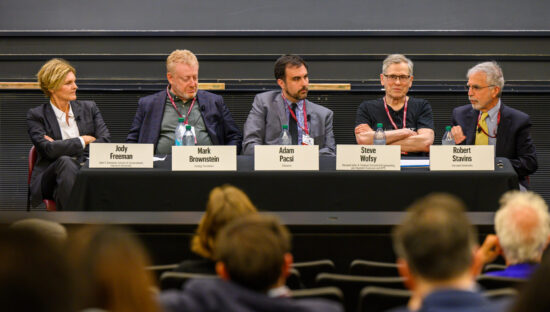

Research Brief: African Rice Cultivation and Methane Emissions
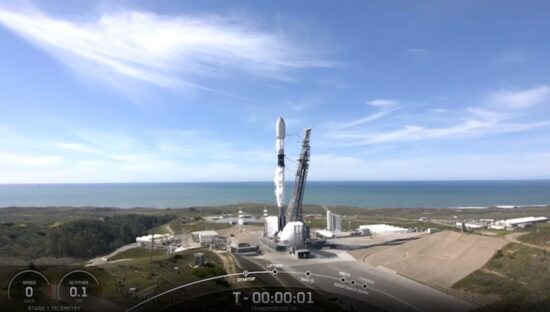
A New Era in Space-Based Methane-Emissions Detection
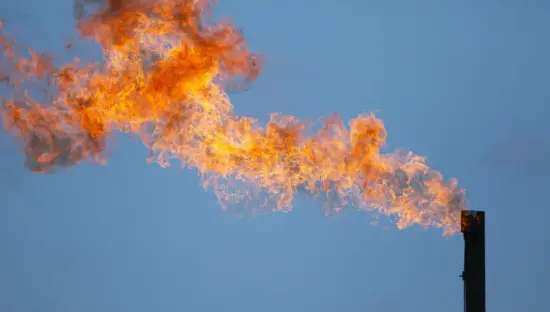
Methane sensors are finding dangerous pollutants in low-income neighborhoods

Research Brief: EPA’s Municipal Solid Waste Landfill Methane Emission Rules

How Reducing Methane Emissions will Slow Climate Change
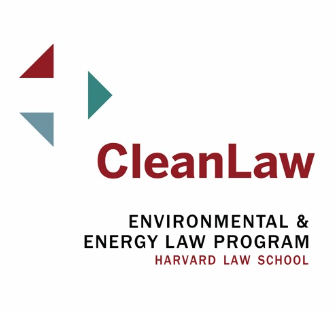
Global and US Methane Emissions Reduction Progress
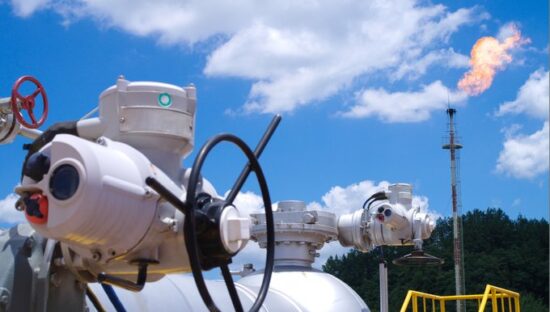
Methane Initiative Collaborator Releases Legal Analysis of IRA's Methane Fee

Harvard delegates reflect on COP28
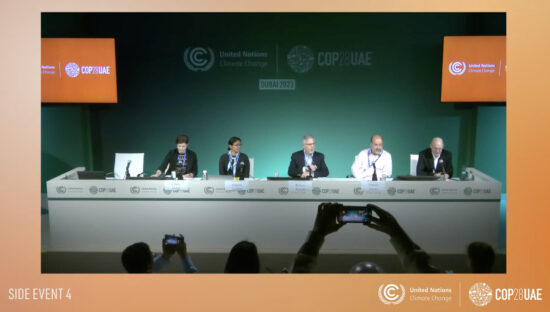
Watch: Harvard Side Event at COP28 on Reducing Global Methane Emissions

Robert Stavins

Joseph Aldy

James K. Hammitt

Daniel J. Jacob

Dustin Tingley

Meghan L. O'Sullivan

Forest L. Reinhardt

Robert C. Stowe

Stephen Ansolabehere

Jody Freeman

Jeffry Frieden

John P. Holdren

Carrie Jenks

Richard J. Lazarus

Emma Rothschild

Michael Toffel

Steven C. Wofsy

Catherine Wolfram
The Harvard Initiative on Reducing Global Methane Emissions, supported by the Salata Institute for Climate and Sustainability at Harvard University, seeks meaningful and sustained progress in global methane-emissions reductions through research and effective engagement with government policymakers – and with key stakeholders in business, nongovernmental organizations, and international institutions. Methane-emissions abatement can, in the near term, significantly reduce the magnitude of climate change and its impacts – giving the world time to “bend the curve” on CO2 emissions, conduct research on carbon removal, and, more generally, to implement longer-term strategies to mitigate and adapt to climate change.
The initiative’s objectives are to build on new scientific research on measurement and attribution of emissions; understand legal, regulatory, and political opportunities and constraints to methane-emissions reductions in the United States and in some other countries; design policies that might best contribute to methane-emissions reduction; work effectively through existing international organizations and alliances, such as the Global Methane Pledge; and define roles that business – and international and multilateral organizations – can play in these efforts.
The intellectual landscape across the disciplines addressed by the methane cluster’s seventeen participating faculty members is exceptionally diverse. These faculty are based in four departments in Harvard’s Faculty of Arts and Sciences (Earth and Planetary Sciences, Economics, Government, and History) and five professional schools (Harvard Business School, Harvard John A. Paulson School of Engineering and Applied Sciences, Harvard Kennedy School, Harvard Law School, and Harvard T.H. Chan School of Public Health). They approach methane-emissions reduction through the disciplinary lenses of natural science, engineering, economics, political science, history, law, business, and policy studies.
The methane initiative seeks to achieve its goals primarily through focused research projects, each conducted by two or more Harvard faculty members. Faculty members within a particular project are, in most cases, from different disciplines and Harvard schools. The projects being pursued in the first year of the initiative are described below. Additional research projects will be identified in the future for the subsequent years of this three-year initiative. The full group of seventeen faculty also meet regularly and communicate electronically to exchange insights and identify synergies across (and beyond) projects.
The organization and management of the initiative ensures that faculty communicate and collaborate across disciplinary and institutional boundaries to support real action to reduce methane emissions. Indeed, this structure is intended to ensure that the whole of the initiative will be greater than the sum of its parts, with regard to both knowledge-generation and impact. The Principal Investigator of the methane initiative is Robert Stavins, A.J. Meyer Professor of Energy and Economic Development at Harvard Kennedy School.
The methane initiative is one of five ambitious, three-year climate-change research clusters that the Salata Institute is supporting. The others address corporate net-zero targets, climate adaptation in South Asia, climate adaptation in the Gulf of Guinea, and approaches to strengthening communities through equitable and locally-driven energy development.
Research Projects Supported by the Methane Initiative in Academic Year 2023-2024
Using Satellite Observations of Atmospheric Methane to Serve U.S. Reporting and Regulatory Needs
Daniel Jacob, Vasco McCoy Family Professor of Atmospheric Chemistry and Environmental Engineering, Harvard John A. Paulson School of Engineering and Applied Science, and Harvard University Department of Earth and Planetary Sciences
Carrie Jenks, Executive Director, Environmental and Energy Law Program, Harvard Law School
The project’s goal is to increase the value of satellite observations of atmospheric methane for reporting and regulation of methane emissions in the United States. In particular, Jacob, Jenks, and their teams: (1) seek to improve reporting of methane emissions from landfills under the U.S. Environmental Protection Agency’s Greenhouse Gas Reporting Program; and (2) develop a near-real-time satellite-based monitoring system for verification of emission reductions and quantification of methane intensities. The project conducted a research workshop on landfill emissions in January 2024, which included 20 experts in scientific and regulatory aspects of the issue.
The Economic Costs of Reducing Methane Emissions
Joseph Aldy, Teresa and John Heinz Professor of the Practice of Environmental Policy, Harvard Kennedy School
Forest Reinhardt, John D. Black Professor of Business Administration, Harvard Business School
Robert Stavins, A.J. Meyer Professor of Energy and Economic Development, Harvard Kennedy School
The project seeks to identify opportunities for applying empirical methods to improve cost estimates, as well as policy instruments for transferring emissions-control responsibilities from one emissions-source category to another (to reduce aggregate abatement costs). In pursuit of this goal, Aldy, Reinhardt, and Stavins are reviewing literature and advancing research on three types of cost estimates: engineering cost estimates, econometrically-estimated measures of costs, and costs revealed through public policies in the United States.
Regulatory Obstacles and Opportunities for Well-Capping in Pennsylvania
Stephen Ansolabehere, Frank G. Thompson Professor of Government, Harvard University Department of Government
Carrie Jenks, Executive Director, Environmental and Energy Law Program, Harvard Law School
Dustin Tingley, Professor of Government, Harvard University Department of Government
This project will convene major stakeholders in western Pennsylvania to discuss ways to address regulatory and economic obstacles to capping natural gas wells that are no longer producing – of which there are at least 400,000 in the area. The objectives of the workshop are to clarify the issues and challenges faced and to develop a blueprint for regulatory and legislative action. Participants will include state regulators, state legislators, current well owners and operators, land owners, community leaders, and experts in emissions and well-capping. Participating Harvard faculty and their teams will consider implications of the findings for other regions of the United States and for other segments of the oil and gas industry.
Arctic Methane Emissions and Climate Mitigation
James Hammitt, Professor of Economics and Decision Sciences, Harvard T.H. Chan School of Public Health
John Holdren, Teresa and John Heinz Research Professor of Environmental Policy, Harvard Kennedy School
The project investigates quantitatively the economic value of narrowing uncertainty about future emissions of methane from thawing permafrost, as a function of how rapidly that narrowing can be accomplished. The work draws in part on findings from ongoing work on monitoring and modeling emissions from permafrost thaw, both at the Salata Institute and in the TED/Audacious-funded Permafrost Pathways Project, whose component at Harvard Kennedy School is directed by Holdren.
Using Remote Sensing Data to Inform Micro-Histories of Methane-Release Sites
Emma Rothschild, Jeremy and Jane Knowles Professor of History, Harvard University Department of History
Steven Wofsy, A.L. Rotch Professor of Atmospheric and Environmental Science, Harvard John A. Paulson School of Engineering and Applied Science, and Harvard University Department of Earth and Planetary Sciences
The project seeks to juxtapose micro-histories of the sites of methane emissions with the extraordinary potential of satellite and aircraft imaging. Its objective is to understand what has been happening in locations that are of central importance to global greenhouse gas emissions, and to understand more about how emissions of methane can be reduced, taking account of the social context. The focus will be on the upcoming flights of the new MethaneAIR remote sensing instrument for measuring methane concentrations along broad swaths of the landscape with very fine spatial resolution and high precision.
International Cooperation to Reduce Methane Emissions
Robert Stavins, A.J. Meyer Professor of Energy and Economic Development, Harvard Kennedy School
Robert Stowe, Co-Director, Harvard Project on Climate Agreements
The project characterizes the complex landscape of international cooperation to reduce methane emissions and will develop recommendations on how international cooperation might be advanced within a diffuse institutional framework. The project may proceed to address in depth: the interaction of trade policy (including with regard to natural gas) and efforts to reduce methane emissions; how large-emitting countries, including China, might advance efforts to abate, in part through international cooperation; and the potential role of cooperation with regard to the development and deployment of abatement technology.
The project conducted extensive outreach and information gathering related to current and potential methane policy developments at the 28th Conference of the Parties (COP-28) of the United Nations Framework Convention on Climate Change in Dubai, U.A.E., in December 2023, including a side-event panel on methane emissions (recording here) and some fifteen smaller meetings with a range of organizations and individuals focused on reducing methane emissions.
Methane Emissions and Trade
Kimberly Clausing, Eric M. Zolt Chair in Tax Law and Policy, School of Law, University of California, Los Angeles
Catherine Wolfram, William Barton Rogers Professor of Energy Economics, Sloan School of Management, Massachusetts Institute of Technology
The project pursues a coordinated approach to a methane border adjustment charge in the oil and gas sector, following on recent legislative and regulatory developments in the United States and the European Union, building on the methane emissions fee that was part of the U.S. Inflation Reduction Act of 2022, and coordinating with Europe and other large importers to levy a nondiscriminatory methane border adjustment on imports when methane emissions exceed an emissions intensity threshold.
Plans for future analysis include an in-depth treatment of how expanding coordination beyond Europe and the United States might affect global oil and gas markets. The project also seeks to refine treatment of intensity standards, better understand how coordinated regulatory guidelines would interact with emissions fees, and further analysis of the incidence of various measures. Outreach is also an important part of this project. The Methane Initiative released a research brief in July 2023 based on Clausing’s and Wolfram’s early work.
Methane and Markets: Firm Incentives to Emit
Coly Elhai, Doctoral Student in Economics, Harvard University Department of Economics
Toren Fronsdal, Doctoral Student in Business Economics, Harvard Business School
This project explores economic factors that influence oil and gas companies’ decisions to emit methane rather than sell additional natural gas. Research evaluates the potential roles in firms’ decisions of oil and gas prices and costs of capturing and transporting gas. The researchers are using a novel data set on methane emissions from the Permian Basin to explore how emissions respond to high-frequency price variation and capacity constraints in natural gas processing and pipelines, as captured by the Henry-Waha Hub price spread.
Project in Preparation: Integrated Methane Inversion Training for Stakeholders
Daniel Jacob, Vasco McCoy Family Professor of Atmospheric Chemistry and Environmental Engineering, Harvard John A. Paulson School of Engineering and Applied Science, and Harvard University Department of Earth and Planetary Sciences
Other faculty members to be determined.
Daniel Jacob and his team at Harvard are developing the second major version of their Integrated Methane Inversion (IMI) platform, which enables users to make detailed inferences about the sources of emissions, drawing on satellite-based detection of methane concentrations. IMI is a user-friendly, open-code tool on Amazon Web Services that enables users with no prior expertise to conduct inversions, visualization, and processing of satellite data. The project will consist of a series of training sessions for stakeholders in low and middle-income countries. Initial planning is for one-day workshops to be offered separately for the Americas, Africa, and Asia. It is likely that the project will begin in fall 2024 – that is, during the second year of the methane initiative.
Participating Faculty Advising Projects
A number of other Harvard faculty members are participating in the methane initiative but not affiliated with the specific projects listed above. They are advising these projects and the larger initiative, as their expertise warrants, and may direct new projects in subsequent years of the initiative. These are:
Jody Freeman, Archibald Cox Professor of Law, Harvard Law School
Richard Lazarus, Howard and Katherine Aibel Professor of Law, Harvard Law School
Meghan O’Sullivan, Jeane Kirkpatrick Professor of the Practice of International Affairs, Harvard Kennedy School
Michael Toffel, Senator John Heinz Professor of Environmental Management, Harvard Business School
External Collaborators
The Harvard Methane Initiative is engaging experts from other universities and organizations as External Collaborators. Currently serving are:
Mark Brownstein, Senior Vice President of Energy Transition, Environmental Defense Fund
Nathaniel Hendren, Professor of Economics, Massachusetts Institute of Technology
start your cluster project
With the new Salata Institute for Climate and Sustainability, Harvard University is mobilizing to meet the global climate challenge.

